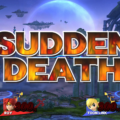Unfinished Buisness: Games of Teenage Existentialism

Several years ago, I had an idea for a short series of posts on games that I found waaaaaaay too much meaning in when I was younger. I self-mockingly called it “Games of Teenage Existentialism,” but that name stuck to the idea hard.
While I played many of these games within that teenage window, some of them came later while I wasn’t finding my adult mindset on schedule.
Tough even now, something will trigger those old feelings every once in a while. One such occasion resulted in the “One Reason Why I Watch Anime post back in ’14 (which is why that post directly references the unused idea).
My particular brand of teenage (and young adultage) existentialism was about longing for some other, better plane of existence than this crapsack world that only seems to get crappier by the year. As such, any game involving the idea of an alternate world or involved some kind of dreamy atmosphere was poised to leave a mark on me.
(Okay, link to old post, check. Link to TV Tropes, check. Still need to squeeze in a YouTube video somewhere…)
I’m reducing this to a hit-and-run single post rather than doing a whole series just to get it out and move on from the idea. After all, there’s still quite a bit of unfinished business yet to be done. As such I’m sticking to the two games mentioned in the anime post. Be warned that there’s going to be spoilers aplenty as we’ll be diving into the plots of all of these games.
The Legend of Zelda: Link’s Awakening
Dreamy atmosphere? Check.
Alternate reality? Check.
Tremendous amounts of fridge horror? Very check.
While it would be a while before the game would make its big reveal, the tone of its first chapter is pretty dreamy. Narratively, we have Link starting the game in bed, but I think the audio is what’s doing most of the work. The music that only plays while you wander back to the beach to retrieve your sword and even the light, extended fanfare upon picking up really eases you into things.
While it takes a while for the literal dreamlike atmosphere of the game to make its big reveal, the game wastes little time building up the consequences of its setting. The game-long item-fetch chain subquest, while rather droll in the Zelda games to follow, was put to brilliant use here. It introduces you to nearly every single resident on the island, informs you of their motivations, and makes you feel awful when you see them fade away to nothing at the end of the game. The end of the budding relationship with Marin was apparently considered so cruel that she alone is allowed to be saved in the “good” ending.
While we could delve into the ethics of the situation — was the fact that Link was the only “real” person there justification for wiping out the entire island just so he could die on a piece of flotsam instead? — my teenage existentialism was far too shallow to even consider that. Koholint Island may as well have been Brigadoon to me. I couldn’t even begin to count the number of times I wanted to play the “Song of the Wind Fish” if it would make all my problems (real or imagined) fade away. That’s what it came down to.
Chrono Cross
I went VERY deep for Chrono Cross. I mean, even the names of its music tracks were designed to push my teen existentialism button (exemplar: “Dream of a Shore Bordering Another World.” Bittersweet, evocative, doesn’t remind us of Musetta’s Waltz).
There’s so many weird things going on in Chrono Cross. Your girlfriend doesn’t join the party, but her alternate universe counterpart who doesn’t know you at all does join. People who meet horrific tragedy in one world live quiet unassuming lives in the other.
All throughout the game, many of the people you recruit attempt to right a wrong that happened in their lives by trying to alter the course of the dimension they didn’t come from. Glenn never had the chance to save his brother until he entered Sergi’s world. Not everybody gets to make the most of a second chance. Even when the wheels of time themselves turn, you can’t defeat Lynx. You can’t save the orphanage. You can’t save Lucca. You can’t even save Gato, for Pete’s sake. All you can do is save Kid.
While Chrono Cross is a game about wrestling one relatively small success from a mountain of failure, the motivations were enough to inspire me. Because while sometimes you drown, sometimes you’re corrupted and sometimes you get absorbed by a Godlike entity, other times you free a town of its ghosts. Other times you avenge a loved one. Other times you can live your best life.
That is, after all what my teenage existentialism was, however ineffectively, looking for: The potential for something different and better.





Sounds like I need to replay Link’s Awakening (or, at least, unlock Marin in Hyrule Warriors). I didn’t look into LA as much as you did, though I played it as a child and didn’t put much thought into any video games back then.